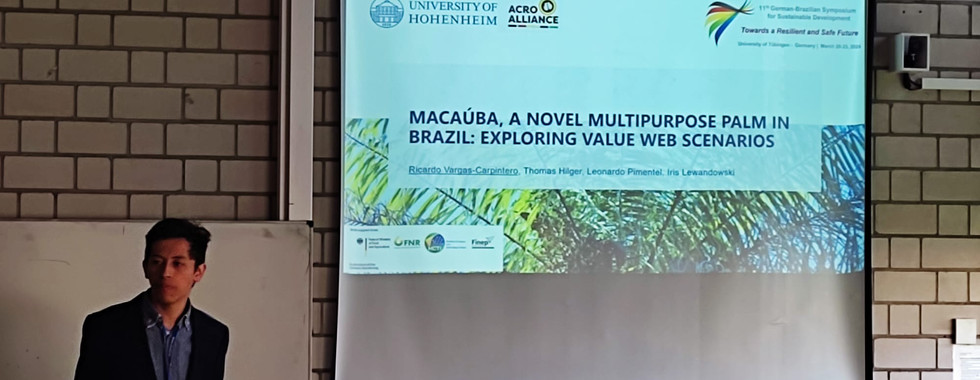11th German-Brazilian Symposium for Sustainable Development Towards at a Resilient and Safe Future
- diegoalbertolopez
- Apr 3, 2024
- 2 min read
Updated: Apr 8, 2024

Last week, the 11th edition of the German-Brazilian Symposium for Sustainable Development took place in the beautiful city of Tübingen, here, researchers and academics from universities, research organization and funding institutions from both Germany and Brazil had the opportunity to take part in an interactive platform for inter and transdisciplinary exchange towards a resilient and safe future. This time, the spotlight of the event focused on issues regarding resilience, value creation, food security and equitable access to natural resources. Participating universities were invited to showcase their respective projects in the following areas:
· Resilience and Adaptation for Sustainable Agri-Food Systems
· Strengthening Resilience by Drug Development and Innovative Medical Treatments
· Green Innovation and Circular Economy for Life and Food
· Human Resilience and Climate Justice
The first day of activities consisted in the welcome and opening remarks, where the main topic and objective “Towards a Resilient and Safe Future” was discussed in a roundtable with representatives from the participating universities. A perspective on sustainable agriculture was presented by Prof. Dr. Georg Cadish, from the University of Hohenheim. A vibrant discussion about the meaning of resilience, future society and geopolitics for sustainability took place in this panel. This was followed by the welcome and round table; an inaugural toast and music attraction sealed the beginning of the symposium.
The following two days, a series of keynotes and discussion panels took place, where the participation of Uni Hohenheim staff, lecturers and moderators was featured. In one of the keynotes, Ricardo Vargas Carpintero, guided us through the AcroAlliance project, which aims to create and develop a sustainable Macaúba palm plantation and value web. He explained the status of macaúba value chains in Brazil and development perspectives. Catherine Meyer, researcher from the University of Hohenheim, presented key insights about the flowering of the macaúba palm. As part of the AcroAlliance consortium, Evellyn Couto, from the Federal University of Viçosa, presented an overview of research on pre-breeding of macaúba, which sets the basis for further breeding and plant material development. Sérgio Henrique de Toledo e Silva, from the Fraunhofer Institute for Process Engineering and Packaging IVV provided an overview of processing and biorefining macaúba fruits for the production of functional oils, proteins and dietary fibers. In a nutshell, macaúba research was very well represented from the flower and seed to high-added value products.
Closer look at the posters presented at the symposium.
To wrap up the symposium, participants had the opportunity to lay back and take part in the excursions and cultural programs arranged by the organizing universities, which included a guided tour through Tübingen and a technical excursion to Uni Hohenheim and Agricultural Museum, as well as the state-of-the-art greenhouse at the Hohenheim campus. Additionally, those interested in the automotive world, had the chance to visit the Mercedez-Benz Museum in Stuttgart.





















Comments